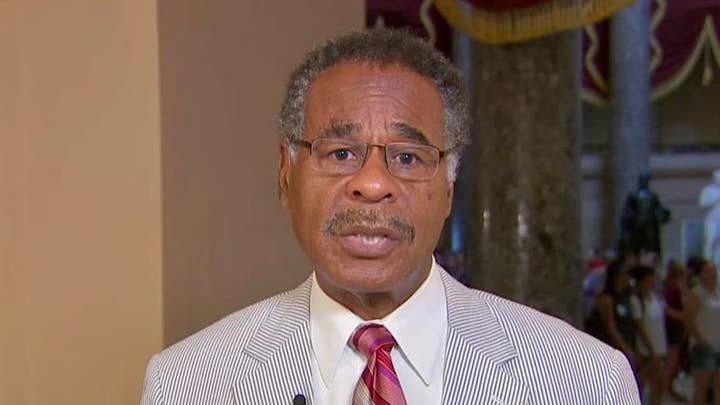Nancy Pelosi says House resolution condemning President Trump was a 'gentle as it could be'
The resolution didn't say that President Trump was racist, only that the words he used were racist, says House Speaker Nancy Pelosi.
Rep. Emanuel Cleaver, D-Mo., was fed up.
"I abandon the chair!" fumed Cleaver from the dais in the House chamber Tuesday afternoon.
Members view the gavel which they wield when presiding over Congressional debates like a sacred antique. The gavel is one of the symbols of the House. But disgusted with fellow House members from both sides of the aisle, a boiling Cleaver chucked the gavel onto the rostrum like a baseball player discarding a bat after a questionable third strike.
PELOSI REMARKS ON TRUMP'S 'RACIST' COMMENTS RULED OUT OF ORDER AFTER FLOOR FIGHT ERUPTS
The Missourian then stomped off the dais, leaving the House of Representatives without a presiding officer right in the middle of a supercharged debate on a resolution "Condemning President Trump's racist comments directed at Members of Congress."
No one could recall an episode where any member, presiding over the House or Senate, had grown so exasperated that they relinquished their post during such a critical moment.
Floor debate on such a divisive resolution required a particular hand on the gavel. Someone who was a Congressional veteran, skilled at moderating testy exchanges. Someone who was fair. Even-keeled. A Zen-like presence who was gentle yet simultaneously firm. So House Democrats tapped Cleaver, a United Methodist minister and former Chairman of the Congressional Black Caucus, for the job.
But Cleaver had had enough.
"We don't ever, ever want to pass up it seems, an opportunity to escalate," seethed Cleaver from the chair. "We just want to fight!"
House Rule XXII, Clause 1(b) bars attacks on "the President’s character." The manual the House uses to this day governing parliamentary discourse – written by Thomas Jefferson himself – bars lawmakers from using language which is "personally offensive to the President." Another volume on House procedure, Cannon’s Precedents - written by the late Rep. Clarence Cannon, D-Mo., not the late House Speaker Joe Cannon, R-Ill. – prohibits "personal criticism, innuendo, ridicule or terms of opprobrium."
So one wondered how lawmakers could possibly debate a measure about President Trump’s "racist comments" and keep the discourse between the guardrails.
It was Rep. Doug Collins, R-Ga., who took issue with the floor speech of House Speaker Nancy Pelosi, D-Calif.
"Every single member of this institution, Democratic and Republican, should join us in condemning the President's racist tweets," said Pelosi on the floor. "To do anything less would be a shocking rejection of our values and a shameful abdication of our oath of office."
Collins asked Pelosi if she cared to re-state her remarks. A defiant Speaker glared at Collins.
"I cleared that with the parliamentarian before I spoke," was Pelosi’s icy reply.
And with that, for the first time in 35 years, a rank-and-file lawmaker challenged whether the Speaker of the House had breached decorum. Collins argued that Pelosi's words – designating the President's tweets as "racist" – crossed the line. The Georgia Republican demanded that Pelosi's words "be taken down."
The "taking down" of words is the Congressional equivalent of being pulled over for speeding. You may have done something wrong. But we have to first go to court to determine guilt or innocence. The House periodically tags rank-and-file members when their language violates House standards. But the late House Speaker Tip O’Neill, D-Mass., was the last Speaker to have words "taken down" on May 15, 1984.
O'Neill didn't appreciate future House Speaker Newt Gingrich, R-Ga., implying that Democrats were silent as he "challenged their Americanism" while speaking to an empty chamber. O’Neill thundered from the House floor at Gingrich, then a mere backbencher, that he had done "the lowest thing I have ever seen in my 32 years in Congress."
Then House Minority Whip and future Senate Majority Leader Trent Lott, R-Miss., thought O’Neill's use of the word "lowest" went too far. The House ruled that O'Neill violated House rules and that his words weren't in order.
It's customary for the House to bar lawmakers whose verbiage runs afoul of the rules from speaking for the rest of the day on the floor. But despite the breach, Lott deferred to O'Neill and asked the House to permit the Speaker the privilege of addressing the House later. The House obliged.
In December 1973, the late Rep. Bella Abzug, D-N.Y., suggested that an amendment offered by the late Rep. John Dingell, D-Mich., was "racist." Never mind that Dingell sponsored the Civil Rights Act of 1957. At the time, the nation was embroiled in the "energy crisis." In an effort to conserve gas, Dingell's plan barred the use of fuel to bus children to school across town. The House ruled that Abzug impugned Dingell and struck her remarks from the record. But the House did not mute Abzug for the rest of that day's session.
Back to Tuesday ...
House custom dictates that a lawmaker whose words are taken down should take a seat in the chamber and wait for a ruling from the chair. But Pelosi left the House chamber after Collins demanded the House adjudicate the Speaker's language.
COLLINS BLASTS PELOSI'S REMARKS: DEMS PASSED RESOLUTION THEY COULDN'T READ ON HOUSE FLOOR
After Cleaver ditched the dais, Rep. G.K. Butterfield, D-N.C., subbed in the chair, followed by House Majority Leader Steny Hoyer, D-Md. After nearly two hours of behind-the-scenes quarreling, Hoyer cited the 1984 precedent, which asserted that Pelosi broke the rules. Collins then asked that the House vote to erase the Speaker’s statement. But on consecutive party-line votes, the House voted that Pelosi didn’t violate the code of conduct and could continue to speak on the floor for the remainder of the day.
"We're going to defend our Speaker," said one senior Democrat while rushing to the vote.
In other words, the House voted against the precedent set in 1984 – which of course, establishes a new precedent.
Appearing Wednesday on Fox, Cleaver said he had the opportunity to rule against practically everyone who spoke on the condemnation resolution. But he didn’t – until Collins took on the Speaker.
"I allowed it to go along because I thought, 'OK. We're not going to start a fight in here,'" said Cleaver, who added that he fled the chair "for my own mental health."
CLICK HERE TO GET THE FOX NEWS APP
Congress was back to brawling Wednesday. The House voted to hold Attorney General William Barr and Commerce Secretary Wilbur Ross in criminal contempt of Congress over the census. The House voted to block an effort by Rep. Al Green, D-Texas, to impeach President Trump. Rep. Sean Patrick Maloney, D-N.Y., presided over the contempt vote. Rep. Chellie Pingree, D-Maine, did the honors for the procedural vote on impeachment.
Despite choleric issues on the floor, perhaps the best news in the House is that neither Maloney nor Pingree deserted the chair.
Perhaps things are looking up on Capitol Hill.















































